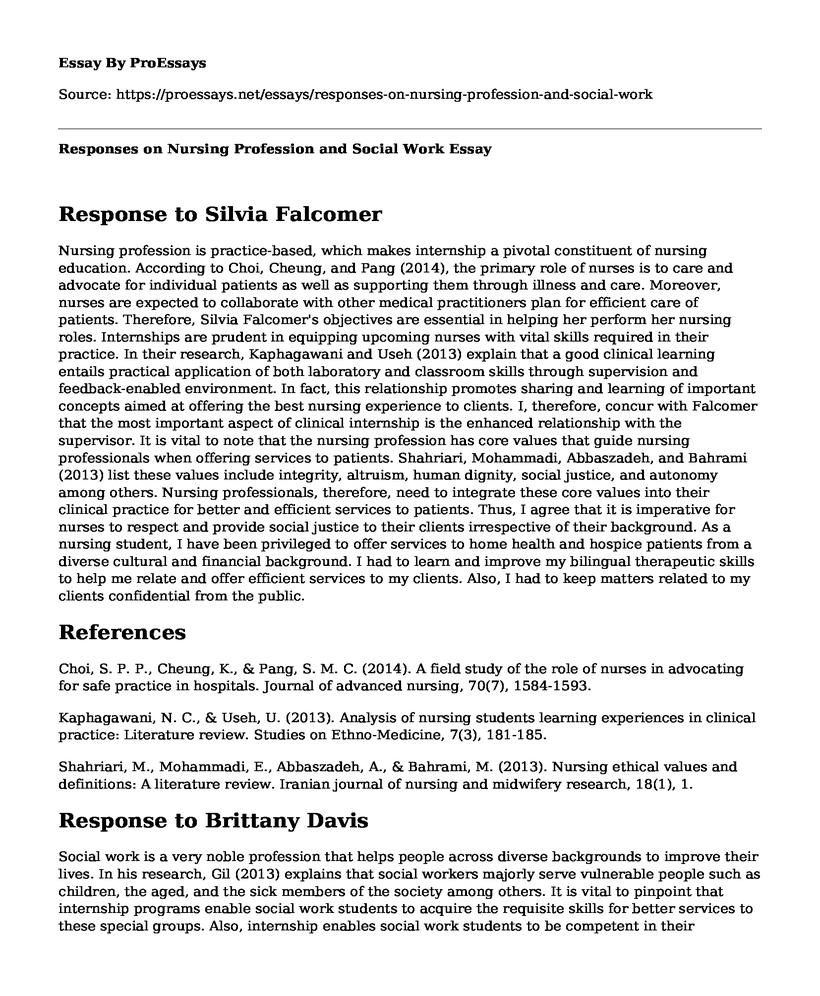Response to Silvia Falcomer
Nursing profession is practice-based, which makes internship a pivotal constituent of nursing education. According to Choi, Cheung, and Pang (2014), the primary role of nurses is to care and advocate for individual patients as well as supporting them through illness and care. Moreover, nurses are expected to collaborate with other medical practitioners plan for efficient care of patients. Therefore, Silvia Falcomer's objectives are essential in helping her perform her nursing roles. Internships are prudent in equipping upcoming nurses with vital skills required in their practice. In their research, Kaphagawani and Useh (2013) explain that a good clinical learning entails practical application of both laboratory and classroom skills through supervision and feedback-enabled environment. In fact, this relationship promotes sharing and learning of important concepts aimed at offering the best nursing experience to clients. I, therefore, concur with Falcomer that the most important aspect of clinical internship is the enhanced relationship with the supervisor. It is vital to note that the nursing profession has core values that guide nursing professionals when offering services to patients. Shahriari, Mohammadi, Abbaszadeh, and Bahrami (2013) list these values include integrity, altruism, human dignity, social justice, and autonomy among others. Nursing professionals, therefore, need to integrate these core values into their clinical practice for better and efficient services to patients. Thus, I agree that it is imperative for nurses to respect and provide social justice to their clients irrespective of their background. As a nursing student, I have been privileged to offer services to home health and hospice patients from a diverse cultural and financial background. I had to learn and improve my bilingual therapeutic skills to help me relate and offer efficient services to my clients. Also, I had to keep matters related to my clients confidential from the public.
References
Choi, S. P. P., Cheung, K., & Pang, S. M. C. (2014). A field study of the role of nurses in advocating for safe practice in hospitals. Journal of advanced nursing, 70(7), 1584-1593.
Kaphagawani, N. C., & Useh, U. (2013). Analysis of nursing students learning experiences in clinical practice: Literature review. Studies on Ethno-Medicine, 7(3), 181-185.
Shahriari, M., Mohammadi, E., Abbaszadeh, A., & Bahrami, M. (2013). Nursing ethical values and definitions: A literature review. Iranian journal of nursing and midwifery research, 18(1), 1.
Response to Brittany Davis
Social work is a very noble profession that helps people across diverse backgrounds to improve their lives. In his research, Gil (2013) explains that social workers majorly serve vulnerable people such as children, the aged, and the sick members of the society among others. It is vital to pinpoint that internship programs enable social work students to acquire the requisite skills for better services to these special groups. Also, internship enables social work students to be competent in their profession. Usually, an intern is assigned a field supervisor with expertise and professional or educational background in the social work field. According to Royse, Dhooper, and Rompf (2016), field supervisors are instrumental in giving advice and guiding interns on important skills and values needed in a given profession. In this regard, Brittany Davis' supervisor is doing a great job in giving her advice and educating her on important skills required in social work career. It is worthy to note that social workers majorly empower and motivate clients as they undergo a therapeutic process. Thus, they require skills that will enable them to freely interact with clients and provide the needed care that will enable clients cope with adverse situations. For this reason, I agree with Davis' objectives of using person-centered approach to acquire skills that will be beneficial to clients such as parenting skills and relaxation techniques, among others. I have been privileged to provide my services to home health and hospice patients. As a social worker, I learned that to deliver efficient and quality services, it is pivotal to relate well with patients, other social workers, and the community. Thus, I find Davis' discussion video recording so informative and educative as far as social work is concerned.
References
Gil, D. G. (2013). Confronting injustice and oppression: Concepts and strategies for social workers. Columbia University Press.
Royse, D., Dhooper, S. S., & Rompf, E. L. (2016). Field instruction: A guide for social work students. Waveland Press.
Cite this page
Responses on Nursing Profession and Social Work. (2022, Jun 22). Retrieved from https://proessays.net/essays/responses-on-nursing-profession-and-social-work
If you are the original author of this essay and no longer wish to have it published on the ProEssays website, please click below to request its removal:
- The Race for Natural Resources in the 19th Century Africa Essay
- Summary of the Area of Interest and Significance to Nursing Practice
- Intervention for Children With Synethesia: The Girl Who Heard Colors Essay
- Essay Sample on Racial Ethnic and Identity
- Essay Sample on Nursing: Benefits, Challenges, and Impact on Lives
- Essay on 5-Year Plan: Essential for Health Care Professionals
- Paper Example on Mauritius Teen Pregnancy Survey: Join the Health Coalition!







